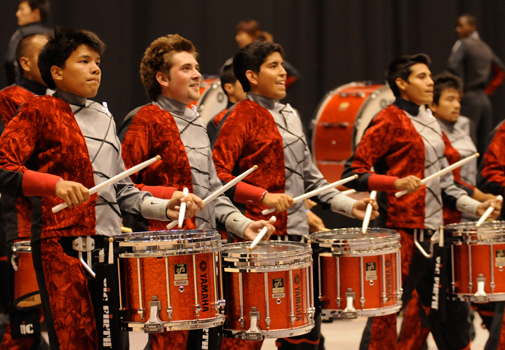In 2005, a new independent percussion unit in Southern California sprung to life. Just five years later, the group hit a high note, winning the 2010 WGI Independent World Championships. Halftime Magazine checks the pulse on Pulse Percussion to find out how the group achieved its momentum and what lies ahead.
Photo by Dan Scafidi, courtesy of WGI Sport of the Arts
From a fledgling percussion ensemble to WGI Independent World Champions in just five years, Pulse Percussion has grown at a rapid pace—pace—improving in standings almost every year in WGI and the Southern California Percussion Alliance (SCPA). Executive Director Danielle Collins has been with the program since its inception. She hopes to continue building upon its strong foundation and maintain Pulse’s status among the elite in indoor percussion.
Halftime: What’s your marching background, and how did you come to Pulse?
Collins: I began at Rancho Cucamonga High School; I was taught by Ken McGrath and Caleb Rothe—two out of the three founders of Pulse. After high school I performed with three different drum and bugle corps including the Blue Knights. I was also involved with the Black Knights for two years and Pulse Percussion from 2005 to 2007.
[Pulse Percussion was started] to provide an opportunity for students who went to four-year universities to be able to perform with a high-quality group. The only local group rehearsed Wednesday and Thursday nights, and that wasn’t feasible for those of us who were in four-year universities or working at night.
One of the reasons Pulse was started was to be on the weekends. I came as a performer, and after I aged out, I began working with the front ensemble and the administration in doing some assistant direction. It just progressed from there.
Halftime: What allowed Pulse to become a successful organization so quickly?
Collins: Pulse was started with this long-term goal of competitive success in mind, so really there was a lot of framework back in 2005 and 2006 when I was still a performer. After Caleb resigned, we had to find a group of people to try to live up to what [he] did.
About halfway through the 2008 season, we convinced John Mapes and Ian Grom to come on board as designers. That made us become more successful a lot quicker. These two guys don’t put anything on the floor that they don’t think will be successful, so once they agreed, we knew it had to be awesome.
Another thing that really helped Pulse was the support. When I was marching, we had one tenor tech, one snare tech, one guy writing the battery music and one person teaching the pit. Now we have three staff members for the pit, two quad techs, four snare techs, and we have one guy who just runs ensemble. We also have consultants, and they all work for free. We have a lot more staff, instructors and support staff who are helping out. Many hands make light work, and so now it’s much more feasible.
Halftime: What’s your show this year?
Collins: The show is called Generation Next, and it looks at the concept that there is so much expected of people: to talk on a cell phone and breathe and walk and work at the same time. More is required of humans, and it’s very difficult to do all of this multitasking.
Halftime: Tell us about your experience as a female drummer in a mostly male activity.
Collins: When I was marching, there were fewer girls on drums than there are now, and we had to work extremely hard. I had an audition for a drum corps early on, right out of high school, and I got the impression that I was not offered a spot because they didn’t think I could physically endure the challenges of the drum corps. So I went and I marched Blue Knights and a few other groups, and I got an email from the person who cut me after he saw me in my first year with Blue Knights, and he said, “I was wrong, and I’m very sorry.”
There has been a girl in Pulse Percussion in the battery every year, so I don’t know if it’s even a second thought now. I think that girls are to the point now where there’s less bias—if any—compared to four or five years ago.
Halftime: What’s in the future for Pulse?
Collins: Originally we were started under the Impulse Youth Arts umbrella, and now we are [separate]. This year we were able to start an ensemble that competes in WGI Independent Open Class. Essentially we doubled the size of our member numbers.
We also have worked with cast directors and production companies in starting our own entertainment group, which … sends our members as gigging musicians.
Halftime: What are your goals this year?
Collins: I am very happy to see the high number of returning members for the world line, and I know that their expectations are just like mine. I would say that we have a standard that we put in place last year, and everyone is now expecting to see something comparable. Pulse Percussion has always improved every year. That is always the goal of Pulse to get even better every year as a program, and this goes for Pulse World as well as Pulse Open.


